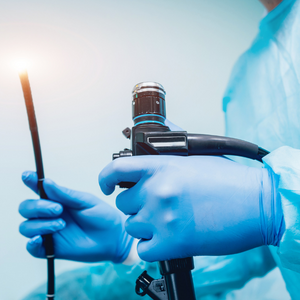Colonoscopy

A colonoscopy is a medical test that lets a doctor look inside your large intestine (also called the colon). The doctor uses a long, thin tube with a light and a camera on the end called a colonoscope to see the inside of your colon. During the test, you will lie on your side on a table while the doctor puts the colonoscope into your rectum (the end of your large intestine). The colonoscope is gently moved through your colon so the doctor can see the inside. The test usually takes about 30 minutes to an hour.
A colonoscopy can help the doctor find problems in the colon, such as polyps (small growths), inflammation, or cancer. The doctor may also be able to treat some problems, like removing a polyp, during the colonoscopy.
Before the test, you may need to follow a special diet and take medicine to clean out your colon. This will help the doctor get a better view during the test. You may also need to take a mild sedative to help you relax during the procedure.
Risks & Benefits
Overall, a colonoscopy is a safe and important way for a doctor to check for problems in the colon. As with any medical procedure, there are risks and benefits associated with colonoscopy. It is important to discuss these with your doctor to determine if the procedure is appropriate for you.
Benefits:
- Allows the doctor to directly visualize the inside of the colon and identify any problems, such as polyps, inflammation, or cancer.
- May be used to diagnose and treat certain conditions, such as removing polyps or taking biopsy samples.
- Can help prevent colon cancer by identifying and removing polyps before they turn into cancer.
- Generally a very safe and effective procedure.
- The most accurate test for detecting and removing polyps and early colon cancer.
- It may help prevent colon cancer by identifying and removing precancerous growths.
Risks:
- Small risk of bleeding or perforation (tearing) of the colon during the procedure.
- Adverse reactions to the sedatives used during the procedure.
- Infection after the procedure.
- May be uncomfortable or embarrassing for some people.
- Adverse reactions to the sedatives used during the procedure, such as drowsiness or dizziness.
FAQs
A colonoscopy is a medical test that lets a doctor look inside your large intestine (also called the colon). The doctor uses a long, thin tube with a light and a camera on the end called a colonoscope to see the inside of your colon.
A colonoscopy may be done to help diagnose or treat certain conditions, such as polyps, inflammation, or cancer. It may also be done to check for problems in the colon or to monitor for changes after treatment for a condition.
During a colonoscopy, you will lie on your side on a table while the doctor inserts the colonoscope into your rectum (the end of your large intestine). The colonoscope is gently moved through your colon so the doctor can see the inside. The test usually takes about 30 minutes to an hour.
A colonoscopy is usually not painful, but you may experience some discomfort or cramping during the procedure. The doctor will give you a sedative to help you relax and may also give you medication to help reduce any discomfort.
Before a colonoscopy, you will need to follow a special diet and take medicine to clean out your colon. This will help the doctor get a better view during the test. Your doctor will provide specific instructions on how to prepare for the procedure.
In most cases, colonoscopy is performed on an outpatient basis, meaning you will be able to go home the same day as the procedure. However, if you have other medical conditions or if there are complications during the procedure, you may need to stay in the hospital for a longer period of time.
Recovery time after colonoscopy may vary, but most people are able to return to their normal activities within a day or two. It is important to follow your doctor’s instructions for care after the procedure to help ensure a smooth recovery.
Your doctor will likely schedule a follow-up appointment after your colonoscopy to discuss the results of the procedure and any necessary follow-up care.
Colonoscopy may be covered by insurance, but it is important to check with your insurance provider to confirm coverage.
Colonoscopy may be used to diagnose and treat colon cancer. If the doctor finds cancer during the colonoscopy, they may be able to remove it or take a biopsy sample for further testing.
You may need to follow a special diet after a colonoscopy to allow your colon to heal. Your doctor will provide specific instructions on what you can and cannot eat.
Colonoscopy is generally considered the most accurate test for detecting and removing polyps and early colon cancer. However, it is not perfect and there is a small chance that it may miss some polyps.